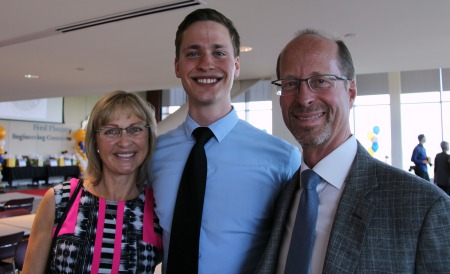
BROUGHT TO YOU BY: Sam counts his mom and dad (Connie and Dave Anderson) as chief among the supportive community behind his success.
(EDMONTON) As part of his recent graduation ceremonies, Sam Anderson collected the Governor General's silver award for academic achievement. It's the highest academic award available to undergraduate students. Created in 1873, the award is something he has in common with Pierre Trudeau, Kim Campbell and Gabrielle Roy.
Anderson has always had academic success. Still, he was worried when started university.
"I grew up in Lloydminster, a smaller community. I wasn't sure what to expect of students from big high schools in the city. In first year I wanted to see if I could still get good grades," he says. The worry led him to put his nose to the books. "I remember calling my parents before my first midterms and saying 'There's no way I can do this!'" It turned out he could, and he did. Better than pretty much everyone.
A talent for math led him to engineering, but the specifics were harder to come by.
"In first year I didn't really know what I wanted to do," he says. "So I took Engineering Physics because it was so broad. You do a lot of different stuff, and I wanted to help people."
A google search for "U of A nanotech" led him to the work of Jillian Buriak. "She does things like solar film research and a lot of cool nano stuff," Anderson says. (He eventually wound up working for Buriak on thin-film solar cells.)
His interest led him to a capstone project with Abdul Elezzabi and also to Mani Vaidyanathan's lab, where he focused on the modelling of nanoelectronic devices. "It was my first experience in modelling, and the idea that a person can start with physics and build up to an understanding of real-world issues is something I'll take with me as I go off into modelling earth science problems," Anderson says.
He'll be pursuing a master's degree next year at UBC in atmospheric sciences. "I'm kind of shaking it up-it's not the next logical step. My path came together at the U of A, and I realized I'm passionate about things like climate change and water." He's joining a research group that does glacier modelling.
"Our glaciers are receding. That's where we get a lot of our water. What do we do in 10, 15, 100 years when they're gone?"
To seek answers, he'll focus on precipitation modelling, looking at how, in a changing climate, precipitation in the mountains will govern when and how fresh water will become available. The research group is focusing on the Rockies, building a framework they can apply to all mountainous regions. "Look at the glaciers in Asia. They are a major source of fresh water, with the rivers feeding all across Asia," he says. "There's a lot of human impact."
But it was never a sure thing that Anderson would study engineering or science. "I love English and I was torn between studying English and engineering. I ended up choosing engineering because-to me-it had the clearest impact, helping the greatest number of people."
Once he was satisfied he could manage the workload, Anderson wanted to expand his horizons in second year. He lived in Lister Hall and became the floor co-ordinator, an elected position. He also served as treasurer, then co-president of the Engineering Physics Club, and he wrote in the Lister newspaper. His favourite outreach activity was as a volunteer tutor.
"A friend of mine started a club to offer free tutoring to high school students," he says. Tutoring can run upwards of $60 an hour. Anderson and his friends made extra help accessible to students who couldn't afford it.
Despite his good grades, the Governor General's award came as a surprise. An avid hiker, Anderson was on a trip to New Zealand with his friend and fellow Faculty of Engineering graduate Max King when he got the word. "I was in a café with Max, and I got this email. I just sat there, and I was like-what?-I never considered it. It's just overwhelming and humbling," he says.
It's not the only award Anderson has won. One he is proudest of is the Henry Birks and Sons Medal. Specific to engineering, it takes into account a student's grades and looks for a demonstration of leadership and character. Another award for the shelf is the C.D. Howe Memorial Fellowship, which will help subsidize his graduate degree.
But the biggest prize comes with neither cash nor medals.
"My journey at the U of A was enabled because of the community I had. Without my parents, friends and loved ones, I never would have made it through," he says. "I'm so grateful for this experience."